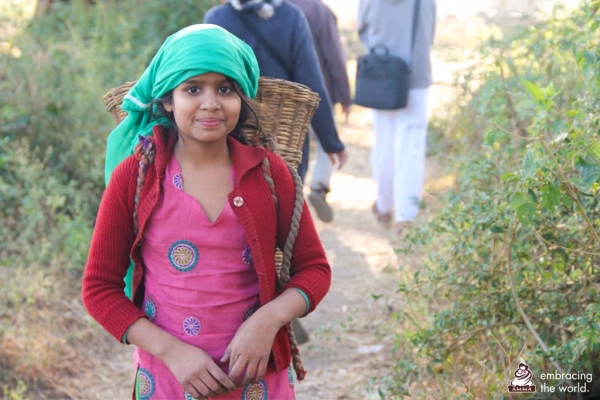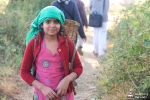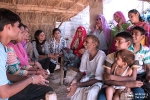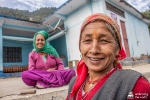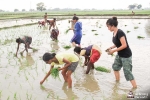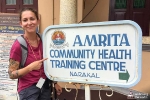The Chair will be held by Amrita for the next four years under the leadership of Dr Maneesha Sudheer, the Dean of the University’s International Programs and Director of its Center for Wireless Networks & Applications. As a UNESCO Chair, Amrita becomes part of more than 700 institutions that share knowledge and expertise to improve their educational and research capacities.
“This is the second UNESCO Chair awarded to Amrita Vishwa Vidyapeetham in the past four years after it received India's first-ever UNESCO Chair on Gender Equality & Women’s Empowerment,” says Dr Sudheer. “It is a great privilege for us to have achieved this recognition once again.”
The curriculum is based upon experiential learning where students spend time in villages and work in partnership with villagers to learn about the life challenges faced. Together, the students and local people seek solutions that will best suit the villagers’ needs on a long-term basis. This enables the academic community to acquire the knowledge, skills, attitudes and values necessary to help other vulnerable communities in the future.
“Our much-acclaimed experiential learning program, Live-in-Labs, was conceptualized by our Chancellor, Sri Mata Amritanandamayi Devi, whose vision for Amrita has always included compassion-driven research and sustainable development,” continues Dr Sudheer.
“Over the years, Live-in-Labs has contributed towards sustainable development of rural communities across 21 states. This work led to us being allotted this prestigious UNESCO Chair. We will now be able to take our experiential learning concept to the entire world in collaboration with other UNESCO Chairs and universities across the globe.”
The activities will feature post-graduate programs, including the options of Joint PhD, Double PhD and dual Masters programs. It will also hold short-term certificate courses, research, conferences, scholarships, and installation of model labs. The goal of the labs is to check the practicality of solutions for sustainable development before they are implemented in communities.
As an extension of Live-in-Labs, Amrita established a PhD in Sustainable Development in September 2019. Named E4LIFE, it is a fully-funded International PhD fellowship whose aim is to accelerate the empowerment of more than 100 villages that the university has adopted across India. Amrita will fund a total of 100 international and Indian students and is all set to receive the first group of 60 soon, out of which 45 are international candidates.
“This Chair and the work we will do under it are important because challenges to modern development are rising due to lack of access to basic resources like energy, water and other infrastructure, education, climate change, and lack of resilience when struck by disasters,” explains Dr Sudheer.
“Despite the advancements made in science and technology, simple and basic necessities are not being met for a majority of the population across the world. It is about time to think how the contributions of high-end research work translate to those belonging to the vulnerable sections of society.”
Amrita started Live-in-Labs in 2013 so students could experience first-hand the difficulties faced by India’s rural communities. The idea is if students are taken to live in such communities for a period of time, they will be inspired to better understand the villagers’ problems and collaborate with them to innovate sustainable solutions.
Live-in-Labs works with 101 villages throughout India. In these, it has implemented over 150 projects, supporting more than 200,000 people. About 400 international students from 40 international partner universities have participated in the program so far.
Photo 1: A girl in Dunda, Uttarakhand starts her daily chore of collecting tree branches from the local forest.
Photo 2: Villagers and students hold a meeting in Nani Borvai, Gujarat to get to know each other before starting discussions on the challenges the village faces.
Photo 3: Elders in Dunda, Uttarakhand.
Photo 4: Three social work students from Ryerson University in Toronto, Canada help women in Hadiabad, Bihar with rice crops.
Photo 5: Damara is a nursing student from Ryerson University who travelled to Ratanpur, Bihar to work with the Musahar people, one of India's most impoverished scheduled caste communities.



